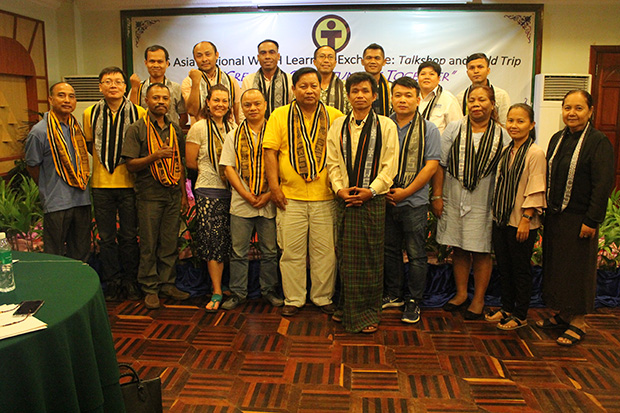This blog is the last in a four-part series focusing on CWS water, sanitation and hygiene programs in each of four Asian countries where we work. (Read Part 1: Cambodia, Part 2: Myanmar or Part 3: Vietnam if you haven’t yet!) This one focuses on Indonesia and Timor-Leste. It’s important to know that the acronym WASH stands for Water, Sanitation and Hygiene.

Our group at the learning exchange. In this photo, everyone is wearing scarves that were woven by women as part of one of our programs in Indonesia!
Access to safe water is a rising concern around the world, and water crises have made headlines in recent years. In Flint, Michigan, more than 100,000 people have been experiencing a water crisis since 2014. And in Cape Town, South Africa, the government had to impose severe water rationing in order to prevent the city of 3.5 million-plus people from running dry.
These are anomalies in the more-developed world, which is why they make headlines. As my colleagues from Indonesia and Timor-Leste pointed out at a recent learning exchange for CWS teams in Asia, though, there are places around the world where issues like this might actually feel like an improvement over the current situation.
How can this be so, I wondered?

By the end of the nine-month dry season, only one spring near Mateos’s village was still running. It was barely a trickle, so it could take up to an hour to fill a container that was barely larger than a milk carton. Families would get in line at 3 a.m. to wait for their turn, and some would still be there late into the night. The last families would fill their buckets or jerry cans and head home at 11 p.m. With your help, CWS helped the community protect their spring and build a water storage tank. Thanks to these improvements – and teamwork among families – every family can now meet their water needs.
Well, there are countless places on the island of Timor – which encompasses the nation of Timor-Leste as well as West Timor, which is part of Indonesia – where access to clean water has never been a reality. In these places, a lack of water, clean or dirty, in endemic. Water for home use, for school sanitation and for agriculture is always in short supply.
CWS works in many such places, and those of us at our learning exchange learned a lot from our Indonesia and Timor-Leste teams about innovative ways to improve safe water access and ways to use water wisely.
One of the ways that these teams improve water access is through the use of ram pumps, which move water uphill from low-lying areas without using electricity. The staff also partner with families and communities to start A-frame drip watering systems for their home gardens, which use water much more efficiently than conventional garden layouts.
When we talked about sanitation, the Indonesia and Timor-Leste teams shared how they are helping to provide custom latrines that are easier for people with disabilities to use.

This is a biosand construction training session in Vietnam. Local teams are learning to build these inexpensive and effective devices for household and school use. Photo: Shanley Studio
We had learned a lot about biosand water filters from our Vietnam team, who prioritize these inexpensive and effective filters for both families and schools. My colleagues from Indonesia and Timor-Leste talked about their plans to introduce biosand filters into their programs as well so that families who are currently relying on dirty or contaminated water will have a way to purify it and make it safe for consumption.
On Timor island, where access to safe water is rarely a reality in rural areas and where few organizations have WASH programs, the government is planning to increase access to water. Unfortunately, the progress is slow. Many families must manage their lives without access to this most basic and most important resource.
We’re doing our best to change the equation and make sure that more people have access to clean water and latrines.
Ek Sothea is the Grant Coordinator with the CWS Cambodia team.

